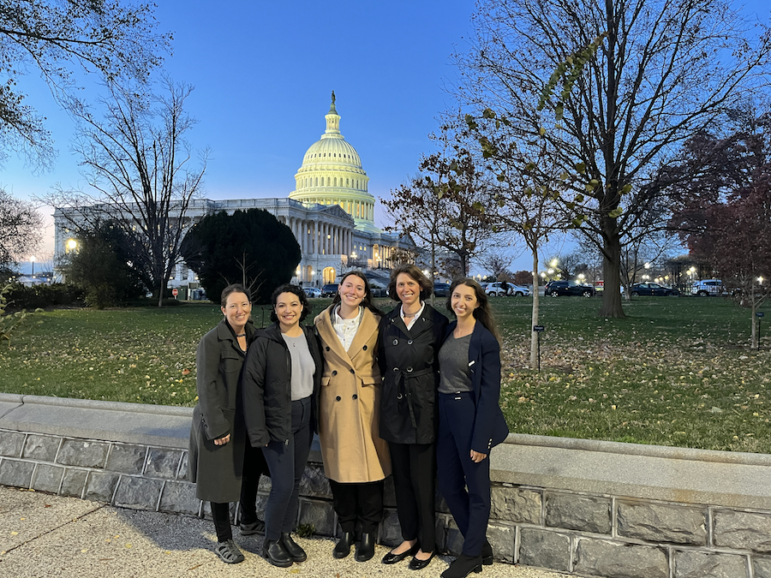Whale Conservation on Capitol Hill
Last week, Whale and Dolphin Conservation, Animal Welfare Institute, Endangered Species Coalition, Environmental Investigation Agency, and Oceana partnered to host a congressional briefing and to lobby on Capitol Hill in Washington, DC. The congressional briefing titled, “Coast to Coast Strategies for Saving America’s Whales and Marine Life: Addressing Climate Change Impacts” with Dr. Heidi Pearson and Dr. Erin Meyer-Gutbrod was held in coordination with the House Sustainable Energy and Environmental Coalition’s Nature and Oceans Task Force.
The briefing and subsequent discussions with Senators’ and House Representatives’ offices from coast to coast aimed to bring awareness to recovery goals and benefits for large whale populations and the protections necessary to aid them in their recovery. Whale conservation is a bipartisan issue; therefore, it will require bipartisan solutions and support.
For North Atlantic right whales, protecting bedrock environmental laws like the Endangered Species Act and Marine Mammal Protection Act is crucial to bring their species back from the brink of extinction. “Supporting current robust legislation like the EPA and MMPA, seminal pieces of legislation that are working, should stay intact and still receive continued full support,” said Dr. Heidi Pearson.
Credit: WDC, Lobby day one with Dr. Erin Meyer-Gutbrod, Jewel Tomasula (ESC), Caroline Mowdy (WDC), Dr. Heidi Pearson, and Taylor Mann (Oceana). Thank you, Ericca Gandolfo (AWI), for taking our photo.
Whales are ecosystem engineers
The ocean produces more oxygen and absorbs more carbon than all of Earth’s forests combined, and whales help it to flourish. Dr. Pearson’s research focuses on the importance of whale conservation for healthy marine ecosystems. Her research explores how whales are ecosystem engineers who increase ocean biodiversity, productivity, and carbon cycling. Whales enhance nutrient and carbon cycling through the excretion of nutrient-rich waste products that stimulate phytoplankton growth. This stimulates the base of the food web, increasing nourishment to other marine animals such as fish. This means whales may also provide economic value to coastal communities who depend on healthy fisheries.
In some countries that practice whaling, there’s a misconception that whales are diminishing fish populations and disrupting fisheries, when in reality, whales help the ocean flourish. “Whales are not competition,” said Dr. Pearson. “Supporting research on the role of whales in ecosystem functioning can put the US at the forefront of this exciting new field of study.”
Credit: WDC, Lobby day two with Caroline Mowdy (WDC), Jewel Tomasula (ESC), Dr. Erin Meyer-Gutbrod, and Taylor Mann (Oceana)
Recovery of large whale populations
Critically endangered North Atlantic right whales are doing their part by reproducing, but there are only about 370 remaining and only 70 of those are females who can give birth. “We have to protect the reproducing females, said Dr. Meyer-Gutbrod. “They are the most important part of the population if you want the population to grow.” The good news is that the population decline has started to stabilize. Less than a month into the start of the calving season, we already have two confirmed births to celebrate. Now, we must protect them from their two major threats, accidental entanglement in fishing gear and vessel strikes.
We are seeing great progress with on-demand fishing gear. With over 10,000 hauls by commercial fishermen, and a 90% success rate, we are confident that there are solutions to allow fishing and whales to co-exist.
Vessel strikes also remain a significant threat, and protections to this threat need improvement. Vessel speed limits should be adjusted to reflect the range of vessel sizes that could kill or seriously injure whales, and the times and places where strikes occur. It’s also important to get high compliance rates to vessel speed limits. Dr. Meyer-Gutbrod’s research focuses on how climate change shifts whale habitat and complicates protections. Whale prey is shifting to new locations due to climate-driven warming and changes in ocean circulation. “Whales don’t tend to care too much about changes in temperatures and salinity, but their prey does. The whales follow the food,” said Dr. Meyer-Gutbrod. “It’s really important that protections to reduce vessel strike and entanglement risk are flexible. The protections only work if they overlap with where and when whales are present.”
Credit: WDC, Meeting new friends on Capitol Hill
Support for science and research
A new piece of legislature was also introduced this month, the Whale Conservation Habitat Analysis, Research, and Technical Strategies (CHARTS) Act of 2024. WDC is always happy when members of Congress acknowledge the importance of whales in the ecosystem and the need to support research.
While additional research is always welcome, we strongly urge Congress and the Marine Mammal Commission to consider the pressing needs for increased funding for ongoing aerial surveys to locate and monitor the health of North Atlantic right whales as well as the critical support needed for the stranding response and disentanglement organizations. These data from animal responses are relied upon by multiple federal agencies including the National Oceanic and Atmospheric Administration, Department of Defense, National Institute of Health, Army Corps of Engineers, and more.
Credit: WDC, Humpback whale
We need whales
As ocean conditions change on our shared planet, we need coastal resiliency and climate ready fisheries. We urgently need to restore nature and re-whale the ocean, while allowing culturally and economically important fisheries to thrive. If we can protect whales, they can recover.
We must save the whales to save the world.
The post Saving America’s Whales on Capitol Hill appeared first on Endangered Species Coalition.

